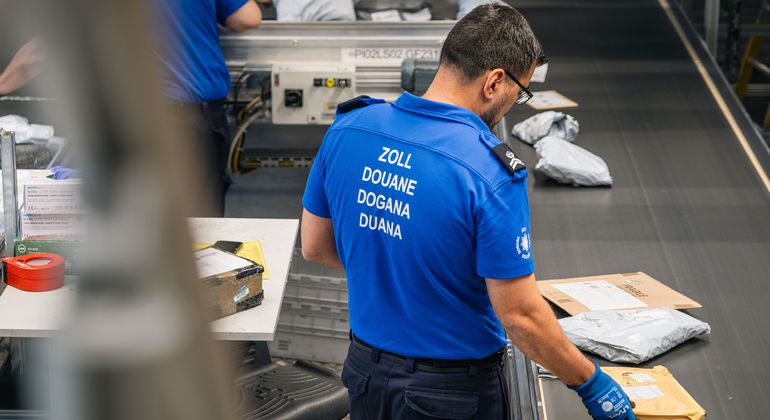For IP professionals
This is the portal for professionals working in the field of intellectual property. Here you'll find direct access to all necessary resources.
Quick links
Working together to combat counterfeit products more efficiently
On 1 July 2025, the new “Simplified Procedure for Destroying Counterfeits in Small Con-signments” will enter into force. This legislative document redistributes tasks between the Swiss Federal Office for Customs and Border Security (FOCBS) and the Swiss Federal Insti-tute of Intellectual Property (IPI) and makes the entire process more efficient. Esther Wüest, an expert in non-customs legislative instruments in the Policy Directorate of the FOCBS Management division, sheds light on the new procedure in this interview.

Esther, how did this new, simplified procedure come about?
In 2017, the Finance Committee of the National Council submitted a postulate calling for the enforcement of non-customs legislative instruments by the former Federal Customs Administration (now known as the Federal Office for Customs and Border Security, FOCBS) to be reviewed and analysed. The aim was partly to standardise and further digitalise processes and partly to enable the FOCBS to focus on its core competencies, in other words its inspection activities, in future. In autumn 2019, the Federal Council published its report on the matter. The first meeting with the IPI followed shortly afterwards. We’re delighted that the operational roll-out is now under way.
What does this legislative change mean for the FOCBS and what is your stance on the matter?
The IPI will now be responsible for carrying out the procedure involving counterfeits in small consignments containing no more than three items and weighing no more than five kilos. This reduces the relevant administrative work for the FOCBS while enabling us to focus on inspection activities as per our mandate. We will still be responsible for managing applications for assistance and carrying out the procedure for larger consignments, in other words consignments containing more than three items and weighing more than five kilograms.
We believe this legislative change and the new procedure constitute a positive development. The simplified procedure for the destruction of small consignments saves work for all parties involved until now. Around ninety percent of the counterfeits seized by customs are imported into Switzerland in small consignments. These are primarily items that have been ordered online, and they have steadily increased in number in recent years. We’re pleased that our workload in this area will be reduced.
“Collaboration with the IPI has been positive and constructive since the start. We have suc-cessfully identified good solutions together and implemented them accordingly.”

Esther Wüest, Expert in Non-customs Legislative Instruments
Federal Office for Customs and Border Security (FOCBS)
Who will decide what is and isn’t a counterfeit item in future?
Detecting suspected counterfeit goods will stay the same as before. If, when carrying out a goods inspection, FOCBS employees suspect that a package contains counterfeit products, they will detain the items. In the case of small consignments, they will hand them over to the IPI. In all other cases, they will contact the applicant directly to inform them that the consignment has been detained. However, for all consignments, small or otherwise, it will remain the case that only the rights holder will definitively be able to decide whether the detained item is a counterfeit.
Does the Simplified Procedure for Destroying Counterfeits in Small Consignments infringe the rights of the item’s owner?
No. The owner, in other words the person who ordered the item, will still be informed that the item they have purchased is a suspected counterfeit. They will still have ten working days to appeal against the destruction of the item. If the person consents to the destruction of the item, the rights holder cannot take any further legal action. This person is also deemed to have consented if they fail to explicitly object to the destruction of the item within the statutory notice period.
Will the FOCBS be able to detain even more counterfeit items in future?
The FOCBS carries out its inspections based on location and risk. This means that we don’t systematically inspect everything. Instead, we carry out spot checks wherever there is the greatest risk of potential infringement. The staff available perform the FOCBS’s inspection mandate in all areas. In other words, they are deployed wherever they are needed most as the situation requires. If inspection activities are intensified in a given area, this will have a knock-on effect in other areas. At this stage, it’s too early to comment on how the legislative change will affect the number of counterfeit items that are detected and detained.
